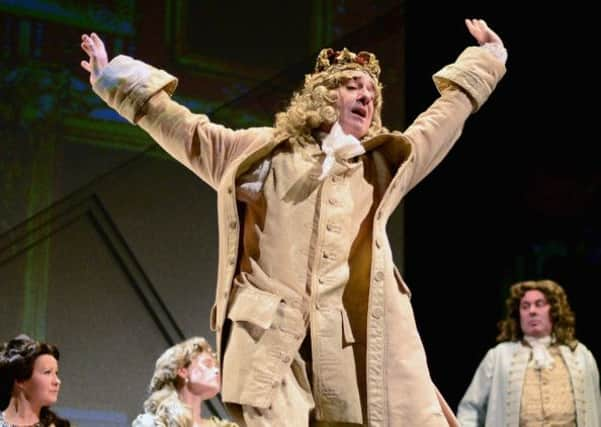Theatre review: Union, Edinburgh


Union - Royal Lyceum, Edinburgh
***
Yet their political skill is not negligible, particularly in the case of Liam Brennan’s towering Duke of Queensberry. And in Mark Thomson’s visually thrilling production of Tim Barrow’s new play Union, these flawed men are surrounded by a surging symphony of images conjuring up taverns and palaces, rainy nights and drunken days, all projected – in Andrzej Goulding’s memorable design – on to whirling blank walls, and accompanied by Philip Pinsky’s insistent and haunting harpsichord music, always played a notch too loud for comfort.
No description of this memorably rowdy and ambitious play can even begin to convey the extraordinary mixture of brilliance and incoherence it contains, the dizzying swoops from crass caricature and stereotype to sudden lyrical beauty. Somewhere at the core of Union, there is a play about what happens when things that should be priceless are sold for hard cash.
Advertisement
Hide AdThe play’s twin stories involve the love affair between passionate young poet Allan Ramsay and a prostitute called Grace, who sells herself for the money she needs to live, and the parallel sell-off of Scotland’s sovereignty, as the people starve and Scotland’s leaders strike a deal which will open up our economy to English markets and an age of empire.
This could have been, in other words, a powerful and telling historical drama about a timeless conflict between what is right and self-respecting on one hand, and what is necessary for survival on the other. Instead, though, it emerges as a fierce, giant puppet show with flashes of seriousness, and long detours into strange tales like the grotesque history of Queen Anne’s childless madness.
It’s significant that the strongest and most interesting scenes are the ones in the Scottish Parliament itself; the weakest are those set in England, where the English negotiators are portrayed as absurd fops, and the Scots as a bunch of whisky-toping drunks with uncivilised manners.
Josh Whitelaw yells his way through the role of Allan Ramsay, although he sometimes modulates to a touching lyricism, Sally Reid is subtle and heartbreaking as Grace the whore and Brennan’s unforgettable Queensberry is matched by Tony Cownie’s sinister Lord Stair and Keith Fleming’s chilling English spymaster, Robert Harley. In the end, the best efforts of Mark Thomson’s ten-strong cast go for less than they should have done, in a play that is 20 minutes too long and contains whole tracts of material that should have been saved for another day.
Yet Tim Barrow’s first full-length play approaches the vivid history behind the choice Scotland now faces with such vigour and boldness, and such powerful flashes of poetry and insight, that everyone in Scotland who cares about the nation’s future should see it and then argue about it, far into the night.